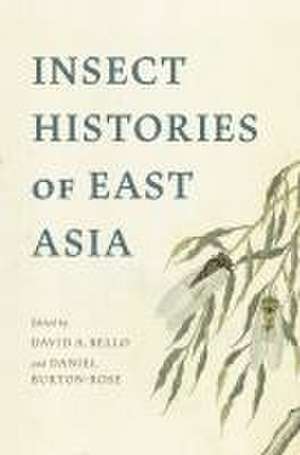Insect Histories of East Asia: Insect Histories of East Asia
Autor David A. Bello, Daniel Burton–roseen Limba Engleză Hardback – 17 iul 2023
Interactions between people and animals are attracting overdue attention in diverse fields of scholarship, yet insects still creep within the shadows of more charismatic birds, fish, and mammals. Insect Histories of East Asia centers on bugs and creepy crawlies and the taxonomies in which they were embedded in China, Japan, and Korea to present a history of human and animal cocreation of habitats in ways that were both deliberate and unwitting. Using sources spanning from the earliest written records into the twentieth century, the contributors draw on a wide range of disciplines to explore the dynamic interaction between the notional insects that infested authors' imaginations and the six-legged creatures buzzing, hopping, and crawling around them.
| Toate formatele și edițiile | Preț | Express |
|---|---|---|
| Paperback (1) | 263.43 lei 6-8 săpt. | |
| MV – University of Washington Press – 17 iul 2023 | 263.43 lei 6-8 săpt. | |
| Hardback (1) | 648.44 lei 6-8 săpt. | |
| MV – University of Washington Press – 17 iul 2023 | 648.44 lei 6-8 săpt. |
Preț: 648.44 lei
Preț vechi: 842.12 lei
-23% Nou
124.10€ • 129.08$ • 102.45£
Carte tipărită la comandă
Livrare economică 14-28 aprilie
Specificații
ISBN-10: 0295751789
Pagini: 288
Dimensiuni: 160 x 231 x 24 mm
Greutate: 0.59 kg
Editura: MV – University of Washington Press
Seria Insect Histories of East Asia
Notă biografică
David A. Bello is E. L. Otey Professor of East Asian Studies and director of East Asian studies at Washington and Lee University. His most recent book is Across Forest, Steppe, and Mountain: Environment, Identity, and Empire in Qing Chinäs Borderlands. Daniel Burton-Rose is visiting assistant professor of history of science, technology, and the environment at Wake Forest University. He is East Asia editor of the journal Asian Medicine. Contributors: Lijing Jiang, Olivia Milburn, Sang-ho Ro, Mårten Söderblom Saarela, Kerry Smith, and Federico Valenti
Cuprins
Acknowledgments
A Note on Terms and Conventions
Chronology of Dynasties, Reign Periods, and Countries
Introduction David A. Bello and Daniel Burton-Rose
Part One: Conceptual Categorization and the Philology of Chong
1. What Did It Take to Be a Chong? Profile of a Polysemous Character in Early China
Federico Valenti
2. The Masculine Bee: Gendering Insects in Chinese Imperial-Era Literature
Olivia Milburn
3. Manchu Insect Names: Grasshoppers, Locusts, and a Few Other Bugs in the Seventeenth and Eighteenth Centuries
Mårten Söderblom Saarela
Part Two: Insect Impacts on the Exercise of State Power
4. Locusts Made Simple: Holding Humans Responsible for Insect Behavior in Eighteenth- and Nineteenth-Century China
David A. Bello
5. A Silkworm Massacre: Agricultural Development and Loss of Indigenous Diversity in Early Twentieth-Century Korea
Sang-ho Ro
6. ¿Lives without Mosquitoes and Flies¿: Eradication Campaigns in Postwar Japan
Kerry Smith
Part Three: The Institutionalization of Entomology in Twentieth-Century China
7. Circumscribing China with Insects: A Manual of the Dragonflies of China and the Indigenization of Academic Entomology in the Republican Period
Daniel Burton-Rose
8. The Dialectics of Species: Chen Shixiang, Insect Taxonomy, and the ¿Species Problem¿ in Socialist China
Lijing Jiang
Glossary of Chinese, Japanese, and Korean Terms
Bibliography
Contributors
Index

